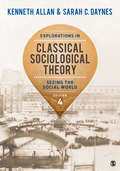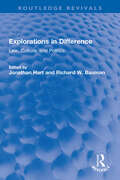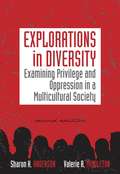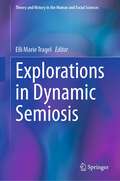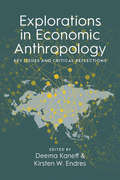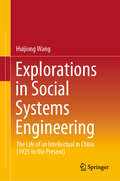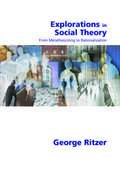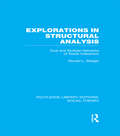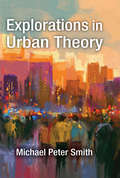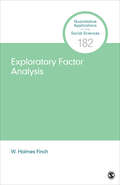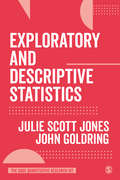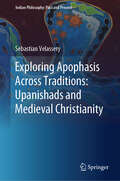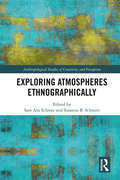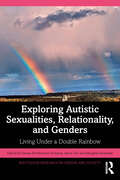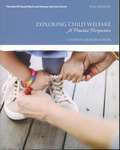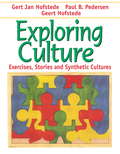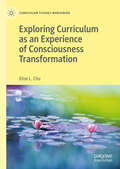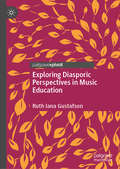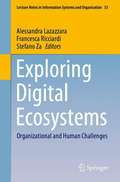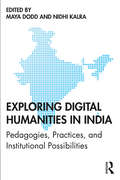- Table View
- List View
Explorations in Classical Sociological Theory: Seeing the Social World
by Kenneth Allan Sarah DaynesPraised for its conversational tone, personal examples, and helpful pedagogical tools, the Fourth Edition of Explorations in Classical Sociological Theory: Seeing the Social World is organized around the modern ideas of progress, knowledge, and democracy. With this historical thread woven throughout the chapters, the book presents a diverse selection of major classical theorists including Marx, Spencer, Durkheim, Weber, Mead, Simmel, Martineau, Gilman, Douglass, Du Bois, Parsons, and the Frankfurt School. Kenneth Allan and new co-author Sarah Daynes focus on the specific views of each theorist, rather than schools of thought, and highlight modernity and postmodernity to help contemporary readers understand how classical sociological theory applies to their lives.
Explorations in Difference: Law, Culture, and Politics (Routledge Revivals)
by Jonathan Hart Richard W. BaumanFirst published in 1996, Explorations in Difference explores how contemporary debates over identity and difference come into play within the workings of cultural, legal, and political institutions. The book brings together a variety of perspectives on the meanings and implications of difference in the context of postmodern theory. It is divided into two parts: ‘Theoretical Accounts’, which establishes a context for postmodern inquiries into difference, and ‘Instances’, which provides application to particular issues. Highly interdisciplinary, Explorations in Difference continues to have lasting relevance and will appeal to those with an interest in postmodern difference and its implications.
Explorations in Diversity: Examining Privilege and Oppression In A Multicultural Society (Second Edition)
by Sharon K. Anderson Valerie A. MiddletonThis unique text features personal accounts from mental health professionals, professors and students facing issues of privilege and oppression in our diverse society. In this collection of articles, writers discuss discoveries and experiences about their own privileges and oppression, and ultimately, the compassion they've developed for individuals confronted with discrimination. Each essay will inspire you to reflect on your own encounters with privilege and oppression, while discussion questions at the end of each story provide an opportunity to process these issues on a personal level. By studying these revealing stories of insight and understanding, you'll learn how to recognize, examine, and finally, come to terms with your own privileges and discrimination -- allowing you to become a stronger, more acute, and more effective practitioner of the helping professions.
Explorations in Dynamic Semiosis (Theory and History in the Human and Social Sciences)
by Elli Marie TragelThis anthology is a manifold combining semiotics and psychology. Chapters in the book are authored by young scholars making sense of semiosis in irreversible time from a multitude of perspectives. The central focus on the dynamics of meaning-making comes together in a variety of topics that align in the core idea of dynamic nature of human making and use of signs. First, this book gives a comprehensive overview of relational dynamics of the sign. The overview is followed by a collection of chapters focusing on various topics relevant for humanities and social sciences, such as experience of time, (cultural) memory, musical signification, human-computer interactions, death and eternity, freedom and responsibility, authenticity, methods for practice and research in psychology, etc. This anthology contributes to the integration of the fields of semiotics and psychology, building on the classic traditions of the Tartu-Moscow School of Semiotics (established by Juri Lotman) and contemporary cultural psychology that has unified social sciences in the recent three decades. Examples of how new semiotic models are applied to various domains of human lives will be given, anticipating the future and addressing its past. As such, this book is a relevant read for everyone interested in the complex nature of meaning-making, and inclusion of dynamics in all expressions of life, including academic research.
Explorations in Economic Anthropology: Key Issues and Critical Reflections
by Kirsten W. Endres Deema KaneffAt a time of rising global economic precarity and social inequality, the field of economic anthropology offers solutions through the study of local and contextualized economic practices. This book is made up of an exciting collection of succinct essays authored by leading scholars primarily from the field of economic anthropology, but also featuring contributions from sociology and history. The chapters engage with debates at the cutting edge of research on the topics of Eurasia, the anthropology of postsocialism and the embeddedness of economic practices.
Explorations in Social Systems Engineering: The Life of an Intellectual in China (1925 to the Present)
by Huijiong WangThis book is more or less a companion volume of the author’s book Introduction to Social Systems Engineering published by Springer in March, 2018. Since social systems engineering is a complex emerging discipline, this book will focus more on the evolution of the concept and the formation process. This is related to the book Introduction to Social Systems Engineering within the context of the author’s working and study experience of around 33 years in engineering and 36 years in policy research and planning at national and regional level.
Explorations in Social Theory: From Metatheorizing to Rationalization
by Dr George RitzerGeorge Ritzer is one of the leading social and cultural commentators of the present day. In this essential new book he considers some of the main tendencies in contemporary social theory. Included here are Ritzer's latest reflections on the uses and misuses of metatheory. According to Ritzer, sociology is a multiparadigm science. The differences and intensities of rivalries between paradigms are often very confusing for students and even for professional sociologists. This book seeks to find a way out of the confusion by sketching out the lineaments of a new integrated sociological paradigm and demonstrates how this paradigm can be applied. It shows the various ways in which Ritzer has developed rationalization theory to shed light on professional integration, the shape of consumer culture, hyperrationality and the state of sociology today.
Explorations in Structural Analysis: Dual and Multiple Networks of Social Interaction (Routledge Library Editions: Social Theory)
by Ronald L. BreigerAt a time when most of the innovative techniques in empirical sociology concern themselves with networks of relations among variables (such as indices of occupational prestige, education and income), the central theme of this volume is that there is much substantive insight and analytical leverage to be gained from a conceptualization of social structure directly, as regularities in the patterning of relations among concrete entities. The view adopted here is that variate distributions measure selected consequences of structural pattern (of the actual connections among individuals or organizations) and, as such, they are useful indicators of questions to be asked in analyzing social structures directly, but they are neither descriptions nor analyses of the structure itself.
Explorations in Urban Theory
by Michael Peter SmithFor over three decades, urban theorist Michael Peter Smith has engaged in constructing innovative theories on central research questions in urban studies. This book brings together his views on the state of urban theory, sorting out the changing strengths and weaknesses in the field. Smith refocuses attention on the cultural, social, and political practices of urban inhabitants, particularly the way in which their everyday activities have contributed to the social construction of new ethnic identities and new meanings of urban citizenship. Combining the methods of political economy and transnational ethnography, he encourages us to think about new political spaces for practicing "urban citizenship" by analyzing the connections linking cities to the web of relations to other localities in which they are embedded. Smith systematically analyzes the dynamics of "community power" and "urban change" under new globalizing trends and increased transnational mobility. Expanding on his original conceptualization of "transnational urbanism," he frames urban political life within a wider transnational context of political practice, in which an endless interplay of distinctly situated networks, social practices, and power relations are fought out at multiple scales, in an inexorable politics of inclusion and exclusion.
Exploratory Factor Analysis (Quantitative Applications in the Social Sciences #182)
by Holmes FinchA firm knowledge of factor analysis is key to understanding much published research in the social and behavioral sciences. Exploratory Factor Analysis by W. Holmes Finch provides a solid foundation in exploratory factor analysis (EFA), which along with confirmatory factor analysis, represents one of the two major strands in this field. The book lays out the mathematical foundations of EFA; explores the range of methods for extracting the initial factor structure; explains factor rotation; and outlines the methods for determining the number of factors to retain in EFA. The concluding chapter addresses a number of other key issues in EFA, such as determining the appropriate sample size for a given research problem, and the handling of missing data. It also offers brief introductions to exploratory structural equation modeling, and multilevel models for EFA. Example computer code, and the annotated output for all of the examples included in the text are available on an accompanying website.
Exploratory Factor Analysis (Quantitative Applications in the Social Sciences #182)
by Holmes FinchA firm knowledge of factor analysis is key to understanding much published research in the social and behavioral sciences. Exploratory Factor Analysis by W. Holmes Finch provides a solid foundation in exploratory factor analysis (EFA), which along with confirmatory factor analysis, represents one of the two major strands in this field. The book lays out the mathematical foundations of EFA; explores the range of methods for extracting the initial factor structure; explains factor rotation; and outlines the methods for determining the number of factors to retain in EFA. The concluding chapter addresses a number of other key issues in EFA, such as determining the appropriate sample size for a given research problem, and the handling of missing data. It also offers brief introductions to exploratory structural equation modeling, and multilevel models for EFA. Example computer code, and the annotated output for all of the examples included in the text are available on an accompanying website.
Exploratory and Descriptive Statistics (The SAGE Quantitative Research Kit)
by Julie Scott Jones GoldringNervous about statistics? This guide offers you a clear, straight to the point break down of exploratory and descriptive statistics and its potential. Anchored by lots of examples and exercises to enhance your learning, this book will give you the know-how and confidence needed to succeed on your quantitative research journey.
Exploratory and Descriptive Statistics (The SAGE Quantitative Research Kit)
by Julie Scott Jones GoldringNervous about statistics? This guide offers you a clear, straight to the point break down of exploratory and descriptive statistics and its potential. Anchored by lots of examples and exercises to enhance your learning, this book will give you the know-how and confidence needed to succeed on your quantitative research journey.
Exploring Aging Masculinities: The Body, Sexuality And Social Lives
by David JacksonThis book explores the lived, embodied experiences of aging men as a counterpoint to the weary stereotypes often imposed on them. Conventionally, in Western cultures, they are seen as inevitably in decline. The book challenges these distorted images through a detailed analysis of aging men's life stories.
Exploring Apophasis Across Traditions: Upanishads and Medieval Christianity (Indian Philosophy: Past and Present)
by Sebastian VelasseryThis book delves into the ethics of apophasis across ancient Indian philosophy, pre-Socratic Greek thinkers, and early medieval Christianity. The chapters explore apophasis in the Upanishads, the Rig Veda, and Sankara’s Advaita Vedanta. The author also offers insights into the evolution of apophasis in the Western tradition, moving from Heraclitus and early Christianity to medieval Christianity. An insightful exploration provides a rich dialogue between traditions and makes it an interesting read for scholars and students worldwide in theology and philosophy.
Exploring Atmospheres Ethnographically (Anthropological Studies of Creativity and Perception)
by Sara Asu Schroer Susanne B. SchmittThe notion of atmosphere has always been part of academic discourse, but often refers to something vague and diffuse - a phenomenon connected with our affective engagement with the world that is difficult to grasp. This volume develops and refines the concept of atmosphere, seeking to render it productive for anthropological and social scientific research by bringing together a range of original ethnographic studies in combination with investigation of the use of the term in language. The chapters examine dimensions of atmosphere through topics of interdisciplinary concern, such as learning and the acquisition of skills, the experience of place, affect and mood, multi-species relations and the perception of weather and environment - whether in natural landscapes, medical and educational settings, homes or creative contexts - Exploring Atmospheres Ethnographically analyses the relational and transformational processes through which people perceive, experience and live in a moving atmospheric world. As such, it will appeal to scholars of anthropology, sociology, geography and cultural studies with interests in space and place, sensory ethnography and affect.
Exploring Autistic Sexualities, Relationality, and Genders: Living Under a Double Rainbow (Routledge Research in Gender and Society)
by Hanna Bertilsdotter RosqvistThis edited collection of contributions explores non-normative genders, sexualities, and relationality among Autistic people.Written within an explicitly neuro-affirmative frame, the collection celebrates the diversity and richness of Autistic identity, sexuality, gender, and relationships, exploring areas such as consent, embodiment, ink, kink, sex education, and therapeutic work. All editors and contributors are neurodivergent and members of the communities that the book focuses on, providing an authentic and unique exploration of gender, sexuality, and relationality in Autistic people by Autistic/other neurodivergent authors.The book is primarily intended for postgraduate students and academics across disciplines including sociology, social work, psychology, disability studies, inclusive and special education, and sexual education. Mental health professionals and educators will also find it a useful resource to support their Autistic clients as well as developing their own understanding about how to support Autistic people in a neurodiversity-affirming, kink-affirming, LGBTQ+, and gender-variant way.
Exploring Child Welfare: A Practice Perspective
by Cynthia Crosson-TowerThe text emphasizes the practice perspective and features numerous case examples that allow students to get a real-life look at the population they will be serving. References to applicable social work competencies appear throughout the book to help guide readers in learning how the competencies apply to practice situations.
Exploring Creativity
by Brian Moeran Bo T. ChristensenUnder the guidance of Moeran and Christensen, the authors in this volume examine evaluative practices in the creative industries by exploring the processes surrounding the conception, design, manufacture, appraisal, and use of creative goods. They describe the editorial choices made by different participants in a 'creative world', as they go about conceiving, composing or designing, performing or making, selling and assessing a range of cultural products. The study draws upon ethnographically rich case studies from companies as varied as Bang and Olufsen, Hugo Boss, and Lonely Planet, in order to reveal the broad range of factors guiding and inhibiting creative processes. Some of these constraints are material and technical; others are social or defined by aesthetic norms. The authors explore how these various constraints affect creative work, and how ultimately they contribute to the development of creativity.
Exploring Culture: Exercises, Stories and Synthetic Cultures
by Geert Hofstede Gert Jan Hofstede Paul B. PedersenExploring Culture brings Geert Hofstede's five dimensions of national culture to life. Gert Jan Hofstede and his co-authors Paul Pedersen and Geert Hofstede introduce synthetic cultures, the ten "pure" cultural types derived from the extremes of the five dimensions. The result is a playful book of practice that is firmly rooted in theory. Part light, part serious, but always thought-provoking, this unique book approaches training through the three-part process of building awareness, knowledge, and skills. It leads the reader through the first two components with more than 75 activities, dialogues, stories, and incidents. The Synthetic Culture Laboratory and two full simulations fulfill the skill-building component. Exploring Culture is suitable for students, trainers, coaches and educators. It can be used for individual study or as a text, and it serves as an excellent partner to Geert Hofstede's popular Cultures and Organizations.
Exploring Culture: Exercises, Stories and Synthetic Cultures
by Geert Hofstede Gert Jan Hofstede Paul B. PedersenExploring Culture brings Geert Hofstede's five dimensions of national culture to life. Gert Jan Hofstede and his co-authors Paul Pedersen and Geert Hofstede introduce synthetic cultures, the ten "pure" cultural types derived from the extremes of the five dimensions. The result is a playful book of practice that is firmly rooted in theory. Part light, part serious, but always thought-provoking, this unique book approaches training through the three-part process of building awareness, knowledge, and skills. It leads the reader through the first two components with more than 75 activities, dialogues, stories, and incidents. The Synthetic Culture Laboratory and two full simulations fulfill the skill-building component. Exploring Culture is suitable for students, trainers, coaches and educators. It can be used for individual study or as a text, and it serves as an excellent partner to Geert Hofstede's popular Cultures and Organizations.
Exploring Curriculum as an Experience of Consciousness Transformation (Curriculum Studies Worldwide)
by Elise L. ChuThis book addresses the issue of de-spiritualization in education through an interdisciplinary lens. It draws on curriculum scholarship of Dwayne Huebner, Martin Heidegger’s interpretation of Plato’s allegory of the cave, Buddhism, theories and philosophies of quantum physics, and philosophical hermeneutics, among others. In doing so, the author identifies the relationship between spiritual truth and education and probes the nature of consciousness, self, and reality. On this basis, she works to explore curriculum as an experience of consciousness transformation vital to the essence and purpose of education and argues for reason with faith and faith with reason as well as the imperative of curriculum imbued with spiritual wisdom and lived experiences.
Exploring Diasporic Perspectives in Music Education
by Ruth Iana GustafsonThis book challenges simplified claims of racial, national, and ethnic belonging in music education by presenting diaspora as a new paradigm for teaching music, departing from the standard multicultural guides and offering the idea of unfinished identities for musical creations. While multiculturalism—the term most commonly used in music education—had promised a theoretical framework that puts classical, folk, and popular music around the world on equal footing, it has perpetuated the values of Western aesthetics and their singular historical development. Breaking away from this standard, the book illuminates a diasporic web of music’s historical pathways, avoiding the fragmentation of music by categories of presumed origins whether racial, ethnic, or national.
Exploring Digital Ecosystems: Organizational and Human Challenges (Lecture Notes in Information Systems and Organisation #33)
by Francesca Ricciardi Stefano Za Alessandra LazazzaraThe recent surge of interest in digital ecosystems is not only transforming the business landscape, but also poses several human and organizational challenges. Due to the pervasive effects of the transformation on firms and societies alike, both scholars and practitioners are interested in understanding the key mechanisms behind digital ecosystems, their emergence and evolution. In order to disentangle such factors, this book presents a collection of research papers focusing on the relationship between technologies (e.g. digital platforms, AI, infrastructure) and behaviours (e.g. digital learning, knowledge sharing, decision-making). Moreover, it provides critical insights into how digital ecosystems can shape value creation and benefit various stakeholders. The plurality of perspectives offered makes the book particularly relevant for users, companies, scientists and governments. The content is based on a selection of the best papers – original double-blind peer-reviewed contributions – presented at the annual conference of the Italian chapter of the AIS, which took place in Pavia, Italy in October 2018.
Exploring Digital Humanities in India: Pedagogies, Practices, and Institutional Possibilities
by Nidhi Kalra Maya DoddThis book explores the emergence of digital humanities in the Indian context. It looks at how online and digital resources have transformed classroom and research practices. It examines some fundamental questions: What is digital humanities? Who is a digital humanist? What is its place in the Indian context? The chapters in the volume: • study the varied practices and pedagogies involved in incorporating the ‘digital’ into traditional classrooms; • showcase how researchers across disciplinary lines are expanding their scope of research, by adding a ‘digital’ component to update their curriculum to contemporary times; • highlight how this has also created opportunities for researchers to push the boundaries of their pedagogy and encouraged students to create ‘live projects’ with the aid of digital platforms; and • track changes in the language of research, documentation, archiving and reproduction as new conversations are opening up across Indian languages. A major intervention in the social sciences and humanities, this book will be of great interest to scholars and researchers of media studies, especially new and digital media, education, South Asian studies and cultural studies.
